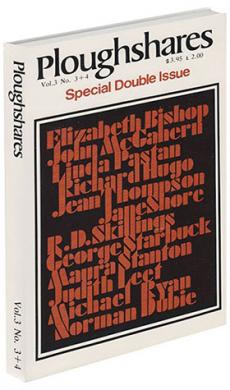rev. of Invisibilities by Douglas Worth
Douglas Worth is another encouraging young poet. The epigraph at the front of his book recalls Sarah Appleton's poetry — "What is essential is invisible to the eye." That this epigraph is a quote not from Teilhard or any similar source but from
The Little Prince points at once to the weakness and the strength of this collection: weakness in relaxing into the most available material, and strength in directness, clarity, and candid beauty. Douglas Worth is like the artists in his "Early Nomadic Animal Art," "Innocent of the latest/city craze/they recast plundered bronze/to what they knew." As in other poetry of this "plain style," some of this writing seems inexplicity and facile. In "Words," for example, the inexactitude and predictability of "you taste each/color" is disappointing; but in the same short poem, the lines "even in those worn smooth/as pebbles, a muted/power" have descriptive originality. In these poems, Douglas Worth is recycling words, in a way, calling on the familiar to be something more than itself, but doing so with starkest brevity. In "Poet":
you go to work
you vote
you read the newsagain
in mid-sentence, stepping down
from the curb, a stone
rolls aside, the air is a river
of wings, your pen runs blood
The visionary quality here, though not explicitly religious as it is in Sarah Appleton, is yet expressed by a sense of being surrounded by the infinite. The poems are printed very nicely (by Apple-wood Press in Cambridge), with ample space around each line, and rather large type, such that the authority and separateness of each poem on the page, surrounded by space, becomes a visual reflection of the spirit of the writing. The poet himself and the poem itself are at the center of the visionary experience, as in "Self-Portrait: Writing".
Beginning in darkness
I see myselfobscurely
in the window
become with the light
the world.
Occasionally these poems seem to fail to transcend their simple and familiar subject matter, and thus they appear insignificant, too localised, and underwritten. This is true, I think, of the poem "Star Market," whose details such as "large, extra large/jumbo" and whose final association of an American supermarket with "bewildering/paradise of the latest/gods" render the poem rather trite. But on the whole, Douglas Worth's work is serious and a pleasure to read, and no doubt will become even more so.


